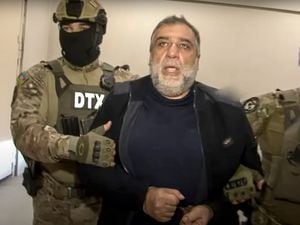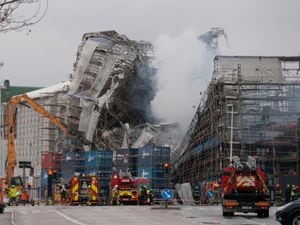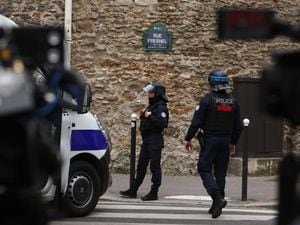ETA’s last known chief faces terror charges in Paris
Josu Urrutikoetxea led the Basque separatist group during one of its bloodiest periods.

The last known chief of the militant Basque separatist group ETA is going on trial in Paris on terrorism charges.
Josu Urrutikoetxea deems the charges “absurd” because of his role in ending a conflict that claimed hundreds of lives in Spain over half a century.
He led ETA during one of its bloodiest periods, when its victims included children killed while they slept after a bombing at a Zaragoza police compound in 1987.
In a rare interview after 17 years on the run, Urrutikoetxea offered an apology, advised other separatist movements against resorting to violence, and painted himself as a changed man.

ETA’s violence caused around 850 deaths and thousands of injuries, and hijacked the Basque and Spanish political debate for decades.
Those who lost loved ones say that just because Urrutikoetxea oversaw ETA’s end in 2018, that does not erase his past.
Spanish anti-terrorism investigators have depicted him as a bloodthirsty advocate of violence who only opportunistically pursued negotiations after police crackdowns and a shrinking support base from Basque separatists weakened ETA.
Now 69, diminished by a battle with cancer and facing the prospect of spending the twilight of a life devoted to Basque independence behind bars, the man widely known by his police alias Josu Ternera, or “The Calf”, says he is sorry for the “irreparable damage” caused by ETA violence as it sought to build an independent state straddling the Pyrenees mountains between Spain and France.

But even when he admits regrets, Urrutikoetxea adds a caveat.
Asked if he would apologise to ETA victims’ families, he told The Associated Press: “Of course, (I offer) apologies for something that we can’t repair.”
But he insisted the Basque independence movement suffered, too, from violence rooted in the Spanish dictatorship under Franco that ended more than four decades ago.
“The Basque country was entering into a black hole” of cultural repression, he said, “and we had to do the maximum to pull it out”.
Some of ETA’s victims said they want more than apologies from Urrutikoetxea; they want him to face justice.
“I don’t seek revenge against Josu Ternera,” said Lucia Ruiz, who was 10 when she was injured in the 1987 blast targeting military police barracks in Zaragoza, where she lived with her father, a civil guard.

“But this gentleman tried to kill me and I want for him to pay a price for it. It’s my right as a Spanish citizen.”
Since his arrest last year, Urrutikoetxea has been on a campaign to shed the terrorist label and rebrand himself as a repentant, aging peacemaker.
Amid growing international support, he won conditional release in July pending trial, after lawyers argued his poor health made him vulnerable to contracting coronavirus.
He is now staying with a professor friend near Paris’s Place de la Republique, where he is trying to get a college diploma and is allowed out a few hours a day with an electronic bracelet.
In a petition published on Saturday, former Sinn Fein leader Gerry Adams, academic social critic Noam Chomsky, separatist Catalan ex-president Carles Puigdemont and more than 250 other intellectuals called for France and Spain to end Urrutikoetxea’s “outrageous and intolerable” prosecution.
By putting him on trial, they argue, “France is implicitly criminalising all negotiators and calling into question all current and future peace processes in the world”.

But across the Pyrenees, those calls are rejected by the vast majority of Spain’s political mainstream.
Spanish newspaper El Mundo described what it called “an operation to whitewash” Urrutikoetxea.
Survivors of violent attacks and relatives of ETA’s victims say the campaign humiliates them.
Ms Ruiz and Spanish authorities believe that Urrutikoetxea, as ETA’s leader, either approved or knew about the car that, loaded with dynamite, exploded under her window at the Zaragoza Civil Guard headquarters where she lived with her father, mother and sister.
Three ETA assailants were tried and imprisoned as the executors of the attack, which killed 11 people, including six minors, all of them Ms Ruiz’s neighbours or acquaintances.
“He now presents himself as the country’s saviour,” Ms Ruiz said.
It will be difficult to prove in court that he orchestrated the attack, she added, because “unfortunately these people don’t leave a paper trail. But this gentleman is a murderer, with murder written in capital letters”.
Urrutikoetxea denies any role, saying: “They want me to answer for something I had nothing to do with.”
He led ETA in the late 1980s, was arrested in 1989 and spent the next 11 years behind bars in France and Spain.
As ETA’s violent methods lost sway, Urrutikoetxea served as a legislator in the Basque regional parliament and a negotiator in talks with Spanish envoys to try to end the group’s activities.

ETA gave up its arms in 2017, and Urrutikoetxea read the statement announcing ETA’s final dismantling in an audio recording released on May 3 2018.
Indicted for his alleged role in the Zaragoza attack while he was on a parliamentary visit to Switzerland in 2002, he was Spain’s most-wanted fugitive until his arrest outside a hospital in the French Alps in May 2019.
He is facing justice this week for the first time in decades, in two back-to-back Paris trials where he is charged with “criminal association with a view to preparing a terrorist act”, for alleged attack plots in the 2000s and 2010s.
He was already convicted in absentia in both cases and sentenced to 15 years total in prison, but after his arrest he asked to be retried.
“This accusation is for actions when I was preparing the ground to work toward a peace process. It’s absurd that they want to judge me for this,” he said.
Urrutikoetxea’s lawyer plans to request a delay in Monday’s trial for procedural reasons. Once the French trials end, France has agreed to extradite him to Spain, although his defence has appealed against this.
Despite some support in France for his cause, French president Emmanuel Macron has stressed ETA’s “grave crimes”, saying that “political reconciliation and renouncing weapons don’t erase anything”.





